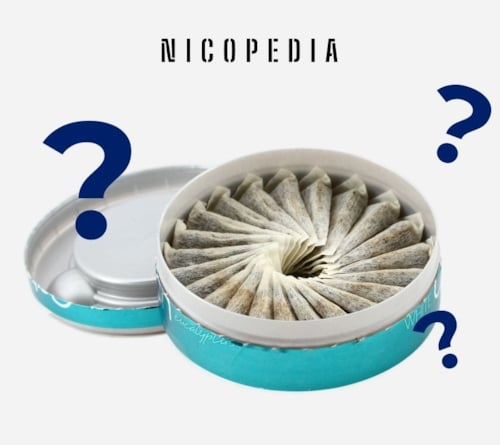Published 2024-12-11
Last update 2024-12-11
Are Nicotine Pouches Safe? Myths vs. Facts
Nicotine pouches have become a popular alternative for those looking to enjoy nicotine without the need for tobacco or smoking. These discreet, tobacco-free products are often viewed as a more convenient option compared to traditional nicotine products. But the question on many people's minds is: are nicotine pouches actually safe? Let’s dive deeper into what nicotine pouches are, their side effects, and what makes them different from other nicotine products.

What Are Nicotine Pouches Made Of?

The first thing to understand about nicotine pouches is their composition. Unlike cigarettes or snus, nicotine pouches do not contain any tobacco leaf. Instead, they are made from a blend of ingredients that deliver nicotine in a convenient, non-combustible form. Here’s what typically goes into a nicotine pouch:
Nicotine
The key ingredient, derived either from a tobacco plant or synthetically created in a lab.
Plant-based fibres
Often used to give the pouch its form and structure.
Flavouring
These range from mint and menthol to fruity or more unique flavours.
Sweeteners
Some pouches may contain artificial or natural sweeteners to enhance the flavour profile.
Nicotine pouches do not contain chemicals that are typically found in cigarettes like tar and carbon monoxide. However, it’s important to note that they still contain nicotine, which can be addictive.
Nicotine Pouches vs. Other Nicotine and Smokeless Tobacco Products
Oral nicotine pouches offer a different experience compared to other popular nicotine delivery methods. Here’s a quick breakdown of how they compare:
- Cigarettes: Nicotine pouches are non-combustible, meaning no harmful smoke is inhaled. There's also no second-hand smoke to worry about, making them more discreet and socially acceptable in many places.
- Snus: Nicotine pouches and Swedish snus are similar in that they are pouches that are placed under the lip. A key difference, however, is that while snus contain tobacco and nicotine pouches do not.
- Vaping: Unlike e-cigarettes, nicotine pouches don't produce vapour, making them more discreet and usable in places where vaping might not be allowed. There's also no need to deal with the maintenance of a vape device, such as charging and refilling.
Side Effects of Nicotine Pouches
Like any product containing nicotine, nicotine pouches come with their share of potential side effects. It’s important to be aware of these before using them, especially if you are new to nicotine or trying pouches for the first time.
1. Nicotine Addiction
Nicotine is addictive, and regular use of nicotine pouches can lead to dependence. Once someone becomes reliant on nicotine, stopping can be challenging, often leading to withdrawal symptoms. These symptoms can include irritability, anxiety, difficulty concentrating, and headaches.
2. Tingling or Burning Sensation
Many users report a tingling or burning sensation under the lip where the nicotine pouch is placed. This is especially common when using pouches for the first time or when using a flavoured nicotine product, such as mint or menthol, which can intensify the sensation.
3. Nicotine Overload
It's possible to consume too much nicotine at once, especially if you're not accustomed to it or if you use stronger pouches. Overloading your system with nicotine can lead to symptoms of including:
- Dizziness
- Nausea
- Vomiting
- Increased heart rate
- Tremors
If you experience any of these symptoms, it's important to remove the pouch and seek medical advice if needed.
Benefits of Nicotine Pouches

Despite their risks, nicotine pouches offer some practical advantages:
- Discreet: Nicotine pouches are subtle and can be used almost anywhere, even indoors.
- Non-combustible: Since there's no smoke or combustion, there's no impact on your surroundings or others.
- No staining: Because they’re all-white, nicotine pouches won’t stain your teeth, unlike cigarettes or other tobacco products.
Are Nicotine Pouches Right for You?
While nicotine pouches can be a more convenient and discreet option compared to other nicotine products, it's important to weigh the pros and cons. Nicotine can be addictive, and overuse can lead to dependency and side effects in some incidences. If you're unsure about whether nicotine pouches are a good fit for your lifestyle, it's worth consulting a healthcare professional for personalised advice.
Final Thoughts on Nicotine Pouch Safety
Nicotine pouches provide a tobacco-free, smoke-free option for those looking to use nicotine. While they offer benefits in terms of discretion and convenience, it's essential to remember that nicotine, regardless of the delivery method, can be addictive and has the potential to cause side effects. As with any nicotine product, moderation is key.
For those who do choose to use nicotine pouches, understanding their potential risks and benefits is crucial. Always start with a lower strength if you're new to nicotine, and pay attention to how your body reacts to avoid nicotine overload.
Remember: it’s always wise to stay informed and use these products responsibly.
Frequently Asked Questions
What are the negative effects of nicotine pouches?
Negative effects can include addiction, tingling or burning under the lip, nicotine overload (nausea, dizziness), and withdrawal symptoms when stopping.
Are nicotine pouches safe?
Nicotine pouches are tobacco-free and non-combustible, making them a potentially reduced-risk alternative to smoking, but they still contain nicotine, which can be additive and has the potential to cause side effects.
Can you use nicotine pouches in public places?
Yes, nicotine pouches are discreet and smoke-free, allowing use in most public places like restaurants or offices, though local rules may apply.
Can nicotine pouches cause addiction?
Yes, nicotine is addictive, and regular use of nicotine pouches can lead to dependency.
Can I purchase nicotine pouches in the UK?
Yes, nicotine pouches are widely available in the UK both in stores and online from reputable nicotine retailers like Haypp.
How are nicotine pouches different from traditional Swedish snus?
Nicotine pouches are tobacco-free and cause less teeth staining, while Swedish snus contains tobacco and has an earthier flavour.
Related articles




